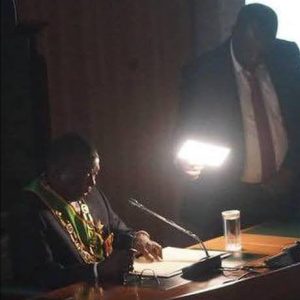
The documentary Mbira Talks, about a Zimbabwean-Canadian musician’s relationship with an instrument once banned during colonisation, took a long time to make. We know this because Moyo Rainos Mutamba is shown plucking his mbira on a Toronto street, with the glittering Honest Ed’s department store in the background.
The lights went out in that building in 2016, and it was torn down a year later. Director Adrienne Amato originally planned to make a film about Stella Chiweshe, the pioneering rebel queen of the instrument, often referred to as a “thumb piano” because of the metal tines affixed to a wooden board that are struck by the first digits of the human hand.
Logistics sabotaged the film on Chiweshe, who died in 2023 at age 76. Amato, who is white and was born in Zimbabwe when it was still under British rule as Rhodesia, immigrated to Toronto in 1977. After Chiweshe’s death, she shifted her focus to Mutamba. Still, the documentary, which premieres online and at the South African Film Festival in Toronto on Monday, took years to make, mostly because of money.
“It’s very specific what gets funding these days,” said the filmmaker, who joined Mutamba on a video call. “Unless you have a celebrity in your doc or it’s a whodunnit crime thing, it’s a difficult landscape for making documentaries these days.”
Amato did not have a celebrity in her film, but she and Mutamba did have one on their side. Canadian indie-pop star Leslie Feist donated her frequent-flier miles for the trip to Africa by Amato, Mutamba and cinematographer Tess Girard. She also helped pay for the digging of a well at the Ubuntu Learning Village, the educational and community hub Mutamba co-founded in rural Zimbabwe.
Mutamba came to Canada more than 20 years ago to study economics at Trent University in Peterborough, Ont. The self-described “village human” finds Toronto too loud and crowded. In 2007, longing for a connection with his homeland, he took up the mbira, a ceremonial instrument tied to traditions of the Shona culture.
The late Chiweshe called the mbira a “telephone to the spirits of people, water, trees and birds.” Deeming it subversive, Rhodesia’s white authorities and Christian missionaries banned the instrument. The mbira is part of Mutamba’s educational mission involving food sovereignty, arts and cultural reclamation.
“I’m intrigued by the power of community,” he said. “People are searching for it. We’re all searching for village.”
Mutamba is both a facilitator and a searcher himself. He longs for home, but Toronto is where he earns a living as co-director of Bloom Consulting, specializing in strategic planning, conflict mediation and psychotherapy. Canada’s wealthy biggest city is his “hunting place,” where money is made to be used in Zimbabwe.
The mbira is more popular in Western Canada than in its eastern counterpart − Vancouver Island is the hotbed. Though the instrument is foreign to Canada, Mutamba believes its effect is universal.
“It provokes certain emotions,” he said. “It is in the body. It’s beyond the otherness. It is a sound that is human.” – TheGlobe&Mail









